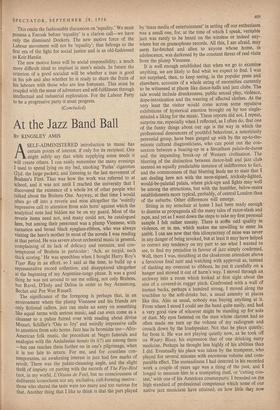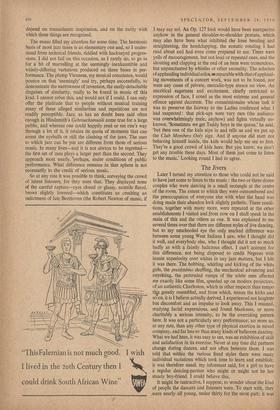At the Jazz Band Ball
BY KINGSLEY AMIS ASELF-ADMINISTERED introduction to music has certain points of interest, if only for its recipient. One might safely say that while supplying some needs it will create others. I can easily remember the many evenings I used to spend lying on my bed, smoking 'PaSha' cigarettes (21d. the large packet), and listening to the last movement of Brahms's First. That was how the work was referred to at school, and it was not until I reached the university that I discovered the existence of a whole lot of other people who talked about the Brahms One. Anyway, at that time I would often go off into a reverie and miss altogether the 'weirdly impressive call to attention from solo horn' against which the analytical note had bidden me be on my guard. Most of the reverie items need not, and many could not, be catalogued here, but among their personnel was a plump Viennese, with carnation and broad black eyeglass-ribbon, who was always visiting the hero's mother in most of the novels I was reading at that period. He was severe about orchestral music in general, complaining of its lack of delicacy and restraint, and con- temptuous of Brahms in particular: 'Ach, so turgid, such thick scoring.' He was speechless when I bought Harry Roy's Tiger Rag in an effort, so I said at the time, to build up a representative record collection, and disappeared altogether at the beginning of my Argentine-tango phase. It was a good thing he was not around to see me selling, not only Brahms, but Ravel, D'Indy and Delius in order to buy Armstrong, Bechet and Pee Wee Russell.
The significance of the foregoing is perhaps that, in an environment where the plump Viennese and his friends are only fictional callers, jazz can make an entry on something like equal terms with serious music, and can even come as a cleanser to a palate furred over with reading about divine Mozart, Schiller's 'Ode to Joy' and weirdly impressive calls to attention from solo horns. Jazz has its bromides too—Afro- American folk music, the procedure at Negro funerals and analogies with the Andalusian hondo (is it?) are among them —but one reaches these farther on in one's pilgrimage, when it is too late to return. For me, and for countless con- temporaries, an awakening interest in jazz had few marks of revolt. There was the palate-cleansing angle, and the slight thrill of impiety on parting with the records of The Fire-Bird (not, in my world, L'Oiseau de Feu), but no consciousness of deliberate iconoclasm nor and exclusive, cult-forming motive : those who shared the taste were too many and too various for that. Another thing that I like to think is that the part played by 'mass media of entertainment' in setting off our enthusiasm was a small one, for, at the time of which I speak, veritable jazz was rarely to be heard on the wireless or indeed any- where but on gramophone records. All this, I am afraid, may seem far-fetched and alien to anyone whose home, in adolescence, was darkened by the constant threat of real visits from the plump Viennese.
It is well enough established that when we go to examine anything, we are likely to find what we expect to find. I was not surprised, then, to keep seeing, in the popular press and elsewhere, accounts of a whole string of enormities currently to be witnessed at places like dance-halls and jazz clubs. The tale would include drunkenness, public sexual play, violence, dope-intoxication and the wearing of affected clothes. At the very least the visitor would come across some repulsive exhibitions of hysterical emotion brought on by too' single- minded a liking for the music. These reports did not, I repeat, surprise me, especially when I reflected, as I often do, that one of the funny things about our age is the way in which the professional denouncers of youthful behaviour, a notoriously perennial group, have been ganged up with by the up-to-the- minute cultural diagnosticians, who can point out the con- nection between a beating-up in a Streatham palais-de-dance and the impending break-up of Western civilisation. The blurring of the distinction between dance-hall and jazz club seemed an equally predictable instance of indifference to fact. and the commonness of that blurring leads me to state that I am dealing here not with the neon-signed, tricksily-lighted, would-be-palatial palais, where pick-ups and fights may well be among the attractions, but with the humbler, below-stairs establishments more typical, probably, of central London than of the suburbs. Other differences will emerge.
Sitting in my armchair at home I had been ready enough to dismiss as propaganda all the many tales of razor-slash and rape, and yet as I went down the steps to take my first personal sample I felt rather uneasy. There is soffie odd quality in violence, or in me, which makes me unwilling to enter its ambit. I can see now that this idiosyncrasy of mine was never in any danger of being invoked, but at least it may have helped to correct any tendency on my part to see what I wanted to see, to find my prejudice in favour of jazz simply confirmed. Well, there I was, mouthing at the cloakroom attendant above a ferocious final tutti and watching with approval as, instead of slashing my overcoat to ribbons, he put it carefully on a hanger and stowed it out of harm's way. I moved through an archway into a room which looked at first sight about the size of a covered-in rugger pitch. Confronted with a wall of human backs, perhaps a hundred strong, I moved along the touchline to the soft-drinks bar, a usual amenity at places like this. Also as usual, nobody was buying anything at it. From where I stood I could see the band quite easily, and had a very good view of whoever might be standing up for solo or duet. My eyes fastened on, the man whose clarinet had so often made me turn up the volume of my radiogram and crouch down by the loudspeaker. Not that he plays quietly; far from it. He was not playing quietly now, as he took off on Weary Blues, his expression that of one drinking nasty medicine. Perhaps he thought less highly of his abilities than I did. Eventually his place was taken by the trumpeter, who played for several minutes with enormous volume and com- parable effect. The unsteadiness I had detected in his recorded work a couple of years ago was a thing of the past, and I longed to measure him in a trumpeting duel, or 'cutting con- test,' with one of his American counterparts: I brooded on the high standard of professional competence which some of our native jazz musicians have attained, on how little they now depend on transatlantic inspiration, and on the rarity with which these things are recognised.
The music filled my attention for some time. The harmonic basis of most jazz tunes is an elementary one and, so 1 under- stand from technical friends, riddled with hackneyed progres- sions. I did not fail on this occasion, as I rarely do, to go in for a bit of marvelling at the seemingly inexhaustible and widely-differing variations produced on these bases in per- formance. The plump Viennese, my musical conscience, would pounce on that 'seemingly' and try, perhaps successfully, to demonstrate the narrowness of invention, the easily-detachable disguises of similarity, really to be found in music of this kind. I cannot rebut this, and would not if I could. I can only offer the platitude that to people without musical training many of these alleged similarities and repetitions are not readily perceptible. Jazz, as has no doubt been said often enough in Hindemith's Gebrauclismusik come true for a large public, and whereas one could happily read or eat one's way through a lot of it, it retains its quota of moments that can arrest the eyeballs or still the clashing of the jaws. The uses to which jazz can be put are different from those of serious music. In many lives—and it is not always to be regretted— the first set of uses plays a larger part than the second. They approach most nearly, "perhaps, under conditions of public performance. What difference remains in that sphere is not necessatily to the credit of serious music.
So at any rate it was possible to think, surveying the crowd of intent listeners, for they were that. They displayed none of the careful rapture—eyes closed or glassy, nostrils flared, brows slightly lowered—which constitutes so crushing an indictment of late Beethoven (the Robert Newton of music, if I may say so). An Op. 127 look would have been unexpected anyhow in the general shoulder-to-shoulder posture, which may also have been what inhibited the knee bending and straightening, the handclapping, the ecstatic rotating 1 had read about and had even come prepared to see. There were yells of encouragement, but not loud or repeated ones, and the shouting and clapping at the end of an item were tremendous, but unpunctuated by whistles or other animality. The solecism of applauding individual solos,comparable with that of applaud- ing movements of a concert work, was not to be found, nor were any cases of private, mescalin-type trance on view. An uncritical eagerness and excitement, chiefly restricted to expression of face, I noted as the most extreme and general offence against decorum. The commissionaire whose task it was to preserve the fairway to the Ladies confirmed what I had suspected : that pick-ups were very rare (the audience was overwhelmingly male, anyhow) and fights virtually un- known. 'Sometimes we get Teddy boys in the queue,' he said, tut then one of the kids nips in and tells us and we put up the Club Members Only sign. And if anyone did start not behaving himself inside, the kids would help me see to him. They're a good crowd of kids here. But you know, we don't get any trouble these days. Most of them just come to listen to the music.' Looking round I had to agree.



































 Previous page
Previous page